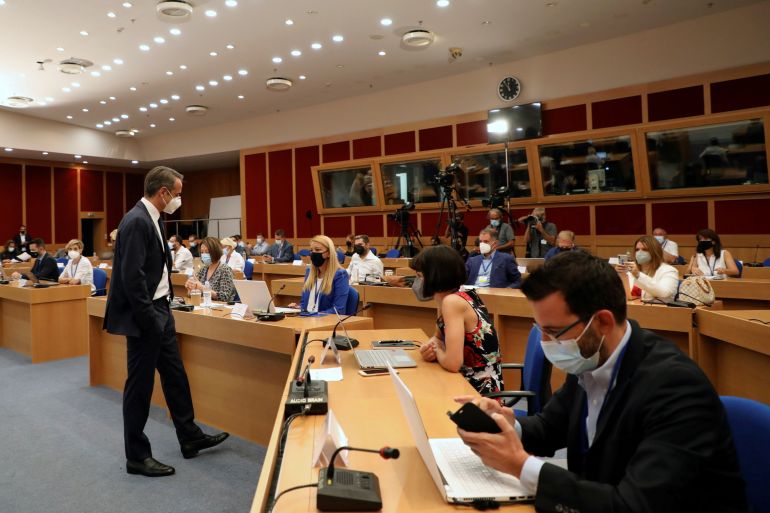Press freedom in Greece under increased threat: Journalists, NGOs
Alleged surveillance of reporters, a law banning fake news, and bullying of a Dutch reporter fuel concerns.

Athens, Greece – Press freedom is increasingly under threat in Greece, according to journalists, NGOs and observers who are concerned by recent events including the alleged monitoring of reporters, what they call a vague law banning “fake news” and the bullying of a Dutch reporter who challenged the prime minister.
Among those affected is Stavros Malichudis, a Greek journalist who believes he is the subject of surveillance by the Greek National Intelligence Service.
Keep reading
list of 4 itemsHow important is press freedom for peace?
Prisons in paradise: Refugees detentions in Greece raise alarm
Is Greece’s trial of aid workers politically motivated?
Malichudis says he discovered he was being monitored after the Greek daily Efimerida ton Syntakton (Newspaper of the Editors) published on November 14 leaked documents from a security services source on how COVID conspiracy theorists were being watched.
The article also focused on the surveillance of those involved in the migration field, including journalists. Malichudis, who works for Agence France Presse (AFP) and the Greek magazine Solomon, was named.
Malichudis was allegedly put under surveillance after working on an article about a 12-year-old Syrian boy in a refugee camp on Kos island whose artwork had appeared in the French newspaper Le Monde.
“In Greece, we like to condemn other countries when it comes to press freedom but never look at our own case,” Malichudis told Al Jazeera. “Since the issue of my monitoring became known, I have had messages of support by journalists from media from all parts of the spectrum. But most Greek media … didn’t even do a news story on this,” he said.
“It’s intrusive, it’s scary and I think it’s the tip of the iceberg.”
Rights groups told Al Jazeera that Malichudis’ story is part of a worrying degradation of press freedom in the country.
On November 17, it was reported that Dutch journalist Ingeborg Beugel had temporarily left Greece after being attacked online, accused of spreading Turkish propaganda, and physically assaulted.
Beugel had questioned Greek Prime Minister Kyriakos Mitsotakis in a heated exchange at a press conference in Athens on November 9, accusing him of lying about pushbacks of asylum seekers, which have been widely documented by European NGOs.
People on social media wrote “I should drown together with the refugees, that I deserve to be tarred and feathered. Many of the comments are very sexist. I cannot read it any more,” Beugel said.
Pavol Szalai, who heads the European Union and Balkans desk for Reporters Without Borders, said: “Press freedom in Greece has taken a dangerous turn in recent weeks. Especially journalists working on migration, which is an issue of national and European public interest, have been increasingly threatened.”
Szalai said that Beugel had endured “a well-orchestrated discreditation campaign on social networks and in pro-government media, but also a physical attack that forced her to plan leaving the country”.
Beugel claims that after her exchange with the PM, a man threw a stone at her in a dark street, striking her forehead.
Szalai urged Greek authorities to condemn the attacks on Beugel, saying that a journalist having to “flee” a European country for safety reasons “is by itself a terrifying testimony of the climate for journalists in Greece, but it will also have long-lasting consequences on press freedom there”.
The monitoring of Malichudis was also “extremely worrying”, he said.
“In a democracy, it is inadmissible to spy on journalists who only do their work. We have called on the intelligence service to provide clarity on this outrageous breach of confidentiality of journalistic sources.”
Further, a new Greek amendment banning “fake news” has stirred fears about its potentially far-reaching power.
The law adopted on November 11, which updated an existing criminal code, makes sharing fake news a criminal offence and states that any citizen who shares false information which is “capable of causing concern or fear to the public or undermining public confidence in the national economy, the country’s defence capacity or public health,” could face fines or a prison sentence of up to three months.
Human Rights Watch (HRW) said there was a “serious risk that the provision could be used to punish media professionals, civil society, and anybody who criticises or takes issue with government policies, creating a chilling effect on free speech and media freedom.”
HRW’s Greece researcher, Eva Cossé, told Al Jazeera: “The Greek government accuses its critics of bias, politically motivated criticism, Turkish propaganda, or factual error, but the truth is simpler: the state of the rule of law and human rights in Greece are failing.
“In Greece, you now risk jail for speaking out on important issues of public interest, if the government claims it’s false. Civil society working on migrant rights is under attack, and the state of press freedom is at its worst. Clearly, Greece has taken the wrong direction on rights.”
In response to questions from Al Jazeera regarding press freedom and the alleged harassment of journalists, a government spokesperson categorically denied monitoring the press.
“Please allow me to reiterate that Greece fully adheres to the values of democratic society and rule of law, especially pluralism and the freedom of the press. Accordingly, it is self-evident that there is no surveillance of journalists in Greece,” the spokesperson said.
Looking ahead, Szalai says he starts every new week “fearing the kind of violation of press freedom the Greek media will suffer … The Greek government must show willingness to protect journalists and take concrete measures to improve press freedom.”